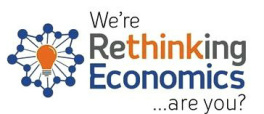Economics becomes more precise and rigorous — and totally useless Nowadays there is almost no place whatsoever in economics education for courses in the history of economic thought and economic methodology. The standard view among mainstream economists is that students shouldn’t think about what they are doing, but just do it. This is deeply worrying. A science that doesn’t self-reflect and asks important methodological and science-theoretical questions about the own activity, is a science in dire straits. The main reason why mainstream economics has increasingly become more and more useless as a public policy instrument is to be found in its perverted view on the value of methodology. How did we end up in this sad state? Philip Mirowski gives the
Topics:
Lars Pålsson Syll considers the following as important: Economics
This could be interesting, too:
Lars Pålsson Syll writes Schuldenbremse bye bye
Lars Pålsson Syll writes What’s wrong with economics — a primer
Lars Pålsson Syll writes Krigskeynesianismens återkomst
Lars Pålsson Syll writes Finding Eigenvalues and Eigenvectors (student stuff)
Economics becomes more precise and rigorous — and totally useless
Nowadays there is almost no place whatsoever in economics education for courses in the history of economic thought and economic methodology. The standard view among mainstream economists is that students shouldn’t think about what they are doing, but just do it.
This is deeply worrying.
A science that doesn’t self-reflect and asks important methodological and science-theoretical questions about the own activity, is a science in dire straits. The main reason why mainstream economics has increasingly become more and more useless as a public policy instrument is to be found in its perverted view on the value of methodology.
How did we end up in this sad state?
Philip Mirowski gives the following answer:
After a brief flirtation in the 1960s and 1970s, the grandees of the economics profession took it upon themselves to express openly their disdain and revulsion for the types of self-reflection practiced by ‘methodologists’ and historians of economics, and to go out of their way to prevent those so inclined from occupying any tenured foothold in reputable economics departments …
Once this policy was put in place, and then algorithmic journal rankings were used to deny hiring and promotion at the commanding heights of economics to those with methodological leanings. Consequently, the grey-beards summarily expelled both philosophy and history from the graduate economics curriculum; and then, they chased it out of the undergraduate curriculum as well.
Methodology is about how we do economics, how we evaluate theories, models and arguments. To know and think about methodology is important for every economist. Without methodological awareness, it’s really impossible to understand what you are doing and why you’re doing it. Dismissing methodology is dismissing a necessary and vital part of science.
Already back in 1991, a commission chaired by Anne Krueger and including people like Kenneth Arrow, Edward Leamer, and Joseph Stiglitz, reported from own experience “that it is an underemphasis on the ‘linkages’ between tools, both theory and econometrics, and ‘real world problems’ that is the weakness of graduate education in economics,” and that both students and faculty sensed “the absence of facts, institutional information, data, real-world issues, applications, and policy problems.” And in conclusion, they wrote that “graduate programs may be turning out a generation with too many idiot savants skilled in technique but innocent of real economic issues.”
Not much is different today. Economics — and economics education — is still in dire need of a remake.
Twenty-five years ago, Phil Mirowski was invited to give a speech on themes from his book More Heat than Light at my economics department in Lund, Sweden. All the mainstream professors were there. Their theories were totally mangled and no one — absolutely no one — had anything to say even remotely reminiscent of a defence. Being at a nonplus, one of them, in total desperation, finally asked: “But what shall we do then?”
 Yes indeed — what shall they do when their emperor has turned out to be naked?
Yes indeed — what shall they do when their emperor has turned out to be naked?
More and more young economics students want to see a real change in economics and the way it’s taught. They want something other than the same old mainstream catechism. They don’t want to be force-fed with useless mainstream theories and models. Precision and rigour purchased at the expense of usefulness is worthless.
